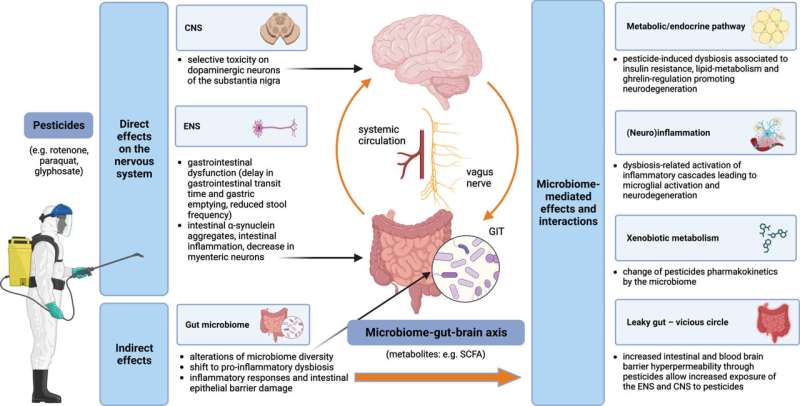This article has been reviewed according to Science X's editorial process and policies. Editors have highlighted the following attributes while ensuring the content's credibility:
fact-checked
peer-reviewed publication
trusted source
proofread
Pesticide exposure linked to risk of developing Parkinson's disease via changes in gut microbiome

While the European Union has just renewed the approval of the use of herbicide glyphosate for another 10 years, scientists issue a call to action to reduce or replace the use of agrochemicals. Pesticides have a long-recognized link to Parkinson's disease (PD) based on epidemiological and experimental evidence from animal models.
A review article in the Journal of Parkinson's Disease analyzes the current evidence and presents future alternatives and recommendations.
"Findings need to be taken seriously, weighing human health higher than other interests, and thus adhering to the third Sustainable Development Goal of the United Nations: Good health and well-being for all," said professor Daniela Berg, MD, head of the Department of Neurology, Kiel University and University Medical Center Schleswig-Holstein, Kiel, Germany.
Experimental evidence suggest that pesticides may exert direct toxic effects on the nervous system, including both the central nervous system (affecting dopaminergic neurons, leading to parkinsonism), and the peripheral/enteric nervous system (leading to gastrointestinal dysfunction and α-synuclein accumulation).
Additionally, pesticides may lead to alterations of the gut microbiota composition and/or function. Dysfunction of the microbiome-gut-brain axis is considered an important contributor to PD pathogenesis. In animal models many of these changes are in line with gut microbiome alterations similar to those seen in PD patients.
This review summarizes the deleterious effects of pesticides and adds implications for a further health hazard: the harmful effect of pesticides to the human microbiome.
"In an elegant and thorough review Kulcsárová and colleagues summarize the evidence directly relevant to the ongoing debate concerning regulations on pesticide use, from the perspective of indirect effects on the brain, through disturbances in the gut barrier function and in its microbiome initiating pathogenic event propagation from the enteric nervous system through the central nervous system," said Diane B. Ré, Ph.D., Department of Environmental Health Sciences, Mailman School of Public Health, Columbia University Medical Center, New York, NY, U.S., in an editorial accompanying the review article.
"Glyphosate for example, the most widely used herbicide, affects the shikimate pathway, which is present in plants, not humans, and is also important for many bacteria. Glyphosate thus limits the survival of some bacteria, leading to a disbalance of microbiome compositions and deficiency of several products of the shikimate pathway that are relevant for humans," explained lead author of the review article Kristina Kulcsárová, MD, Ph.D., Department of Neurology and Department of Clinical Neurosciences, P.J. Safarik University; and Department of Neurology, L. Pasteur University Hospital, Kosice, Slovak Republic.
At a time in which an unprecedented rise in neurodegenerative diseases is occurring globally—with PD projected to double by 2040—the clear evidence of the impact of lifestyle and environment and the undeniably deleterious consequences of using glyphosate and other pesticides require more research to better understand the mechanisms of toxicity and the harmful cascades that appear to contribute to the globally rising incidence of PD. However, there is still reluctance regarding avoidance of harmful pesticides.
"Feeding the increasing world population is a huge challenge," Prof. Berg acknowledged. "However, the rapid increase of neurodegenerative diseases with a clear link to lifestyle and environmental changes including the usage of toxic substances is worrisome. The fact that pesticides are likely to contribute to the increase of PD should lead to a wave of research aimed at understanding the mechanisms of toxicity with the final goal of avoiding them."
"We hope to raise awareness within the scientific community as well as with policymakers and the public in general. Humanity has achieved and still is achieving incredible advancements. No doubt there will be a solution for feeding the world population without poisoning it at the same time."
Based on their research and expertise, the authors recommend the following future pathways to mitigate the potential harms of pesticide use:
- Further investigation is needed into the effects of pesticides on the development of neurodegenerative diseases, with a specific focus on PD and the influence of microbiota composition and metabolism.
- Agricultural techniques should be developed that allow sufficient harvests for the world population without the use of pesticides hazardous to health.
- Policymakers need to support and listen to scientists.
- Awareness of the environment and lifestyle need to increase, which is only possible with clear, evidence-based information.
- Until clear political decisions are reached, there needs to be an emphasis on the use of protective equipment and protective lifestyle approaches.
"Moving forward, there must be a continued push to expand safety guidelines to include considerations of the potential effects of pesticides on gut integrity and the microbiome. This means that global coordinated efforts must be put in place to ensure that standardized biomarkers are developed, validated, and deployed to integrate key changes in the gut and its microbiome that are linked to PD pathogenesis and progression," concluded Hardy J. Rideout, PhD, Neurodegenerative Diseases Lab, Center for Clinical, Experimental Surgery, and Translational Research, Biomedical Research Foundation of the Academy of Athens, Greece, co-author of the accompanying editorial.
"It goes without saying that the regulation of pesticide use is an incredibly complex issue; the goals of minimizing risks to public health have to be aligned with global food supply/insecurity concerns."
More information: Kristina Kulcsarova et al, Pesticides and the Microbiome-Gut-Brain Axis: Convergent Pathways in the Pathogenesis of Parkinson's Disease, Journal of Parkinson's Disease (2023). DOI: 10.3233/JPD-230206





















